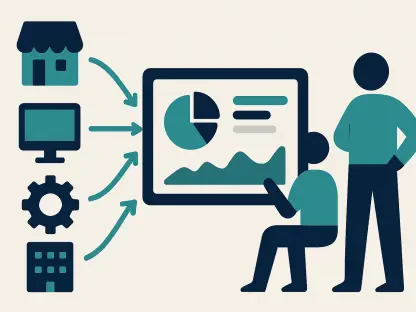In the intricate landscape of property insurance, where the stakes are high and the risks are unpredictable, underwriting emerges as a cornerstone of stability and foresight. At International Catastrophe Insurance Managers (ICAT), this critical function is elevated beyond mere technical analysis to embody a profound cultural commitment. The company has crafted an environment where accountability is not just a policy but the very foundation of its operational ethos. Under the guidance of President Ashleigh Cashman, ICAT transforms underwriting into an art form, blending precision with responsibility to navigate the complexities of catastrophic risk. This approach ensures that every decision, from policy creation to risk assessment, is underpinned by a sense of ownership that drives both individual performance and collective success. As the industry faces evolving challenges like social inflation and natural disasters, ICAT’s focus on accountability sets a benchmark for resilience and innovation, positioning the company as a leader in a competitive market.
This cultural emphasis on accountability permeates every layer of ICAT’s framework, creating a dynamic system where transparency and collaboration are paramount. Underwriters are not only tasked with evaluating data but are also encouraged to take full responsibility for their judgments, knowing that their choices impact the broader organization. This mindset fosters a unique balance of independence and teamwork, where decisions are rigorously debated yet ultimately owned by those who make them. By embedding accountability into its core, ICAT ensures that its team members are empowered to act decisively while remaining aligned with the company’s strategic goals. Such a structure is vital in an industry where a single misstep can have far-reaching consequences, making accountability the linchpin that holds the entire operation together in times of uncertainty and change.
The Cultural Bedrock of ICAT’s Underwriting
Shaping Responsibility Through Foundational Values
At the heart of ICAT’s underwriting philosophy lie four cultural pillars—qualitative debate, thought leadership, technical skills, and community—that collectively define how accountability operates within the organization. Qualitative debate creates a space where ideas are challenged constructively, ensuring that underwriters are held responsible for defending their perspectives with sound reasoning. Thought leadership pushes for continuous growth, holding team members accountable for staying ahead of industry trends and innovations. Technical skills demand a high standard of expertise, with accountability ensuring that knowledge is applied effectively to every decision. Finally, the community pillar builds trust and mutual respect, making accountability a shared value that strengthens team cohesion. Together, these elements create a robust framework where responsibility is not imposed but naturally integrated into daily practices, guiding underwriters to excel in their roles with clarity and purpose.
This cultural foundation transforms accountability from a mere concept into a lived experience at ICAT. Underwriters are encouraged to view their work as a blend of science and creativity, where taking ownership of decisions is both a privilege and a duty. This perspective is reinforced by an environment that celebrates intellectual curiosity, holding individuals accountable for seeking out new solutions to complex problems. Unlike traditional models where responsibility might be seen as a burden, ICAT positions it as a source of empowerment, enabling team members to make bold choices while knowing they have the support of a collaborative system. Such an approach ensures that accountability becomes a driving force for innovation, as underwriters are motivated to push boundaries while remaining grounded in the company’s high standards. This balance is essential for maintaining consistency in an industry prone to sudden shifts and unexpected challenges.
Nurturing a Collaborative Spirit Through Accountability
Accountability at ICAT also serves as a catalyst for fostering a sense of unity across teams, ensuring that underwriting is never an isolated endeavor. The community pillar emphasizes the importance of shared responsibility, where successes are celebrated collectively, and setbacks are addressed as a group. This culture holds each member accountable for contributing to a supportive atmosphere, where trust is the currency of collaboration. By embedding responsibility into interpersonal dynamics, ICAT creates a workplace where underwriters feel compelled to uphold not just their own standards but those of their peers as well. This collective accountability strengthens the organization’s ability to tackle intricate risks, as every decision is informed by a network of insights rather than a single viewpoint, enhancing the overall quality of outcomes in the property insurance space.
Beyond fostering internal bonds, accountability within ICAT’s cultural framework ensures alignment with broader organizational goals, particularly in maintaining client trust. Underwriters are held responsible for decisions that directly affect policyholders, knowing that their actions reflect the company’s reputation for reliability. This sense of duty extends to how teams interact with external stakeholders, ensuring transparency in communication and consistency in service delivery. Accountability, in this context, becomes a bridge between internal culture and external impact, compelling team members to prioritize long-term relationships over short-term gains. As a result, ICAT builds a reputation as a dependable partner in an industry where trust is often hard-earned, demonstrating how deeply ingrained responsibility can elevate a company’s standing among competitors and clients alike.
Operational Synergy and Accountability
Integration of Loss Control and Claims for Enhanced Oversight
ICAT’s operational model exemplifies how accountability extends beyond cultural values into tangible practices, particularly through the integration of underwriting with loss control and claims via its subsidiary, Boulder Claims. This interconnected system ensures that underwriters are held responsible for maintaining risk quality by receiving direct feedback from loss control teams who conduct on-site inspections alongside advanced tools like aerial imagery. The physical proximity of underwriting and claims departments further amplifies this accountability, as teams engage in real-time dialogue to address concerns swiftly. Such a setup means that if a risk fails to meet standards, underwriters are accountable for immediate corrective actions, sometimes even policy cancellations. This rigorous feedback loop not only sharpens decision-making but also embeds a culture of responsibility that prioritizes precision in every aspect of risk management.
The integration also holds ICAT’s teams accountable for creating a holistic view of risk that transcends traditional underwriting boundaries. By linking claims data with underwriting decisions, the company ensures that past experiences inform future policies, making accountability a continuous process rather than a one-time check. Boulder Claims plays a pivotal role in this dynamic, providing insights that underwriters must act upon to refine their strategies. This operational synergy means that accountability is not just about individual performance but about contributing to a larger system of risk mitigation. As a result, ICAT can respond to complex challenges with a unified approach, ensuring that every department is held responsible for upholding the company’s commitment to excellence. This model sets a high standard in the property insurance sector, where fragmented operations often hinder effective risk management.
Real-Time Adaptability Through Collaborative Accountability
Accountability at ICAT drives an impressive capacity for adaptability, particularly through collaborative forums such as the technical underwriting committee. Here, teams from underwriting, claims, and loss control are held responsible for identifying emerging trends like social inflation or catastrophe impacts, ensuring that guidelines evolve accordingly. A notable example is the introduction of a mutual appraisal clause a few years ago, which was directly informed by claims feedback and proved effective during events like Hurricane Ian by curbing loss creep. This real-time responsiveness is a testament to how accountability compels teams to stay proactive, adjusting policies and practices to meet market demands. Such agility keeps ICAT at the forefront of innovation, demonstrating that responsibility is a key driver of progress in a fast-paced industry.
This adaptability is further reinforced by a culture of accountability that demands constant vigilance and improvement across departments. Underwriters are held responsible for incorporating feedback from claims into their decision-making processes, ensuring that lessons from past events shape future strategies. Meanwhile, collaborative committees provide a platform where accountability translates into actionable outcomes, as team members must justify their recommendations with data and foresight. This structured yet flexible approach allows ICAT to navigate uncertainties with confidence, holding every contributor accountable for maintaining a forward-thinking mindset. By embedding responsibility into the fabric of its operations, ICAT ensures that adaptability is not a reaction to change but a deliberate strategy, positioning the company to anticipate and address risks before they escalate into larger issues.
Building Resilience Through Accountability
Structured Reviews for Sustained Performance
ICAT’s dedication to accountability is vividly illustrated in its structured review processes, conducted annually and following major catastrophe events. These evaluations hold teams responsible for dissecting performance across underwriting, claims handling, and risk modeling, measuring outcomes against predefined benchmarks. By fostering a culture where accountability drives reflection, ICAT ensures that every success or challenge becomes a stepping stone for improvement. This methodical approach not only refines the company’s risk appetite but also delivers predictable results to capital providers, reinforcing trust in ICAT’s long-term vision. Such rigorous assessments underscore how accountability serves as a pillar of resilience, enabling the organization to maintain stability even in the face of unpredictable market forces or natural disasters that test the limits of property insurance.
Moreover, these structured reviews embed accountability into ICAT’s strategic planning, compelling teams to align their efforts with overarching goals of reliability and excellence. Each evaluation holds underwriters and associated departments responsible for identifying gaps in performance, whether in policy design or claims response, and proposing actionable solutions. This process transforms accountability into a tool for continuous learning, ensuring that the company does not rest on past achievements but actively seeks ways to enhance its operations. By maintaining transparency during these reviews, ICAT builds a culture where responsibility is synonymous with growth, allowing the organization to adapt its strategies in alignment with evolving industry standards. This focus on sustained performance through accountable practices cements ICAT’s reputation as a steadfast player in a volatile sector.
Empowering Underwriters as Accountable Innovators
Accountability at ICAT empowers underwriters to embrace their role as both analysts and innovators, owning the outcomes of their decisions even when consensus is elusive. As described by Cashman, underwriting is akin to an art, where individual judgment must be balanced with responsibility for the broader impact. This culture holds underwriters accountable for defending their choices with clarity and evidence, fostering a mindset of intellectual rigor. Supported by continuous feedback from loss control and claims, underwriters are equipped to make informed decisions while remaining answerable for their results. This empowerment through accountability ensures that each policy reflects not just data-driven precision but also a creative approach to problem-solving, vital for addressing the unique challenges of catastrophic risk management.
This empowerment is further enhanced by a system that holds underwriters accountable for contributing to ICAT’s strategic evolution. By encouraging bold thinking within a framework of responsibility, the company ensures that underwriters are not merely following protocols but actively shaping them. This dual role of decision-maker and innovator is underpinned by accountability, as team members must align their creative solutions with the organization’s high standards and client expectations. Such a dynamic fosters an environment where responsibility becomes a source of motivation, pushing underwriters to explore new ways of mitigating risk while remaining grounded in practical outcomes. As a result, ICAT cultivates a workforce that is both accountable and visionary, capable of driving the company forward through thoughtful and responsible innovation in the property insurance landscape.
Reflecting on a Legacy of Responsible Practices
Looking back, ICAT’s journey in the property insurance industry reveals how accountability became the cornerstone of its underwriting culture, shaping every decision and interaction over time. The integration of cultural pillars like qualitative debate and community with operational synergies through Boulder Claims established a model where responsibility was non-negotiable. Structured reviews after significant events and annual assessments ensured that accountability translated into measurable growth, while empowering underwriters as decision-makers reinforced a balance of creativity and duty. This legacy of responsible practices demonstrates that accountability is not just a policy but a lived value that defines ICAT’s approach to navigating complex risks. Moving forward, the challenge lies in sustaining this culture by embedding accountability into emerging technologies and market strategies, ensuring that future innovations continue to reflect the same commitment to excellence and trust that guided past achievements.









